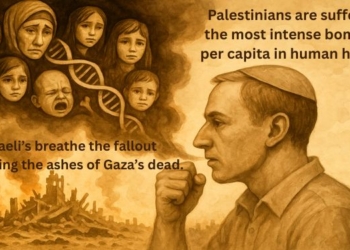
By Jill Suttie | Greater Good Magazine
Right now, our society is being tested on our ability to cooperate. To fight the novel coronavirus pandemic, we need to be able to act as one body and do what we can to stop the virus’s spread and prevent sick patients from overwhelming our health care systems.
But how can we overcome our own self-interests enough to do what it takes to work together—in families, states, and nations? Is the current pandemic leading us toward a world of greater global cooperation—or greater isolationism?
These are some of the questions I posed to Paul Atkins, co-author of the new book Prosocial: Using Evolutionary Science to Build Productive, Equitable, and Collaborative Groups. Atkins facilitates large and small groups to help them to resolve conflicts using methods drawn from evolutionary theory.
To write Prosocial, he joined forces with evolutionary biologist David Sloan Wilson and psychologist Steven Hayes to outline the conditions under which people are more willing to act cooperatively, such as a sense of common identity, the opportunity to share individual needs, and trust in the group process. If these conditions are in place, people are more likely to negotiate differences and act in the interest of the whole.
I spoke to Atkins about the theories behind this approach and how they might be relevant to the current pandemic.
Jill Suttie: Your work on encouraging cooperation in groups seems particularly relevant now. How is this pandemic forcing us to look at group behavior and cooperation in new ways?

Paul Atkins: In some ways, it’s causing us to look at groups more closely in old ways—in the sense of thinking about individual interests and collective interests and trying to create a balance of those. That we’ve been doing for centuries.
But I do think the pandemic is putting us directly in contact with the ways in which we’re all interconnected—my well-being depends on the quality of health care in Iran, for example. This is a moment in history where all of humanity could come together around one common purpose—and there’s pretty much unanimous agreement that we need to try to minimize the spread of the virus. Paul Atkins: In some ways, it’s causing us to look at groups more closely in old ways—in the sense of thinking about individual interests and collective interests and trying to create a balance of those. That we’ve been doing for centuries.
JS: In your book, you write about Elinor Ostrom’s theory about the “tragedy of the commons” and how that affects group cooperation. What is the tragedy of the commons and how does it relate to what we’re experiencing now?
PA: Basically, it’s a situation where the incentives for the individual are such that it seems best to act out of self-interest even though that’s bad for the group as a whole. The classic example of that is the grazing of cattle on a common field. It’s in the interest of each individual farmer to put as many cattle on that shared field as possible, which will lead to all the grass being eaten and which will be bad for everybody.
We’re seeing cases of this now with COVID-19—hoarding toilet paper or masks when other people need them more. There are also more subtle examples—like not social distancing because it’s in my short-term, personal interest to go out to the coffee shop down the road. But if we all do that, we’re going to spread the virus to the whole population. The first case is really clear because there’s a clear resource: toilet paper. But in the case of social distancing, what’s the common good? It’s a little bit more complex.
I could say that I’m going out to support that business and help them economically or to not become depressed because I’m socially isolated. There’s a lot of competing values that come into play, and maybe you realize that the common good is a contested concept. When our common good or common purpose is a contested concept, the idea of the tragedy of the commons gets a lot more nuanced. This is where the concepts behind Prosocial come in.
JS: What are those concepts? What do we need for groups to be more kind, helpful, and cooperative?
PA: There are eight design principles in our book that help groups to act more cooperatively.
The first one is a shared identity and purpose. What do we [as a group] do and what do we share in common? If I know that I share things in common with you, I’m more likely to cooperate with you. That comes out of social identity theory.
The second is ensuring everyone’s needs are being met. How do we do that? By being open to the wholeness of ourselves, both the parts of ourselves that pull us in the direction of the connection, which is deeply programmed within us and the parts pulling us toward self-protection. If someone is complaining about the shop being closed and not being able to get what they need or that they miss socializing, they need to know that what they care about has been heard. You need to have conversations where you listen to people’s concerns. That’s key. Then you can start to use that to build a connection.
The third principle is to make decisions together so that everyone who’s affected has agency in the system. How can we be sure that decision making is fair and inclusive?
The fourth one is to be able to see what others are doing—not so that we can control them, but so that we can trust that others are acting out of collective interest. If people believe others in the society will do the right thing—that they’re compassionate and caring—they’re more likely to participate in voting, to engage in community groups, and (presumably, now) to be socially distancing and taking care not to spread germs with their hands.
The fifth is to influence others by providing contexts that reward people when they’re helpful and discourage them when they are unhelpful.
Finally, the sixth one involves figuring out how we can resolve conflicts as quickly and as fairly as possible.
All of those principles are internally focused within a particular group. But the next two focus more on how a small group relates to other groups. One is essentially about group autonomy. How we can protect our group from undue or excessive interference from the outside that’s disruptive? The last one is perhaps the most important: How can we ensure that the group has relations with other groups that also embody all of the principles—so that there is shared purpose between groups, inclusive decision making between groups, equity between groups, and so forth?
If you frame all of those principles as questions, they’re really good conversation starters. So, if we’re talking about solutions to coronavirus, we need to ask, for example: How do we preserve equity? How do we involve people in decision making?
JS: Does that mean we need leaders who can help nudge us toward thinking through these questions? If so, what would that look like?

PA: When we think of leadership, we automatically think of top-down leadership telling us what to do. And that’s not going to work, because it puts us into a situation where we’re basically having to be coerced. Leadership needs to be everywhere—I’m a leader just as much as the prime minister is or the president is. I can take responsibility.
The other thing is what leaders do. Do they tell or do they ask questions and create conversations? I’m currently in a group helping neighbors to get groceries and medications, and talking to them if they’re socially isolated. It’s a small group, but we want to make sure it’s going to function effectively. We need to be clear about the shared purpose. We need to be clear that some people aren’t doing all the work while other people are getting the media attention. We need to be clear about how we’re making decisions.
What we’re trying to do with Prosocial is to create the conditions that shift us from saying “what’s in it for me?” to “what’s in it for us?” What matters to us collectively and how do we achieve that? The nature of humanity is that we’re not inherently good or bad. We’re responsive to the conditions we’re placed in. It’s useful to focus attention on what’s likely to work to achieve our purposes.
JS: Have you seen different countries handle the coronavirus better than others, perhaps because they value collectivism more than individualism and are better able to look out for the interests of others?
PA: Asian countries have, generally speaking, been doing a lot better job of this than Western countries that have spent centuries focused on individualism. Part of that is because Asian countries have just had more recent and direct experience of similar viruses.
It’s also partly cultural. When a country is accepting of complete lockdown, that’s because they’re thinking about the common good. It’s a different narrative from thinking about how to get my personal needs met, which is what most Western countries—and particularly the U.S.—have really emphasized.
We’re now in a situation where the evolutionary context is mismatched for that; it’s actually pulling us toward collectivism. The hard part from my point of view is how to resolve that tension and not move too far toward top-down government regulation. I don’t want to live in a police state. I don’t want to live in a dictatorship, even if it’s a benevolent dictatorship. I want freedoms.
Ostrom’s genius was looking beyond markets and states—beyond the simple dichotomy between free markets, where everybody competes to meet their own personal needs, and top-down management. We can talk about “commoning” as the capacity to cooperate in small groups—to cooperate in neighborhoods and form mutual-aid groups. Ostrom recognized this was a key alternative to pitting markets against states or getting locked into unhelpful debates between the left and the right. We don’t need that. Markets are great, markets are fantastic. At the same time, top-down regulation is absolutely imperative when it comes to enforcing social distancing.
But there is also this third alternative, the commons, which has the virtue of allowing us to cooperate together effectively with a high degree of autonomy and freedom. The challenge is that it’s not very robust to violations of trust. If someone goes into a cooperative group with the strategy of taking as much as they can get, and the group is not designed to protect itself from freeloaders, they may be exploited. So, we need to create agreements using the eight principles.
JS: How do we use these with governments, though? In the U.S., there’s a lot of rhetoric going around pitting the freedom of the market against the desire to come together to fight a pandemic. The tensions are real. Though I suppose on the positive side, the U.S. just passed a huge $2 trillion aid package that came from bipartisan compromise.
PA: It makes you realize that these things that are supposedly impossible are actually doable within days if the values and the clarity of purpose are there. Here in Australia, a government that’s been doing everything possible to block access to welfare and keep it at the lowest possible level has just doubled welfare overnight. It’s extraordinary.
When the attention goes off of COVID-19, we’ll be back to talking about climate change and things like that. We still have hard limits on how much we can consume; we have planetary boundaries that we cannot exceed. The science tells us that. But, in the sphere of the social commons, it’s more complex, and institutions are all socially constructed. They’re just agreements over how we’re going to work together. If we constructed them one way, we can reconstruct them in a different way.
My hope is that we can have hard conversations without falling into rhetoric and name-calling and instead focus on our shared identity. We could definitely capitalize on this current shared identity and purpose that is emerging in this situation, or we could waste the opportunity by focusing only on the threats, risks, and dangers in the world and disconnect from others. We could use it as a way to build fortresses or as a way to build a community garden.
JS: There’s a theory that positive emotions help broaden your perspective and build personal resources, while fear does the opposite. Do you think encouraging positive emotions—like gratitude or compassion—is relevant to moving groups toward more cooperation?
PA: Yeah. Anything I can do to create a sense of safety and connection to others is good. Practicing gratitude, for instance, is fantastic. It draws attention to our connections to others and to what I have rather than what I’m missing.
Our willingness to engage in cooperative behavior toward others is dependent on whether we think we’re going to be reinforced for that. If all our attention is on what the media shows—that you’re going to get exploited or hurt—then, of course, we’re not going to act cooperatively. But if we can draw our attention back to what happens most of the time—most of the time you cooperate and engage in loving relations—people reciprocate.
Gratitude practice, compassion practice, other practices—provided they’re not approached in an inauthentic way, but to genuinely connect with what really matters—can shift our attention and our expectations and build trust between people.
















